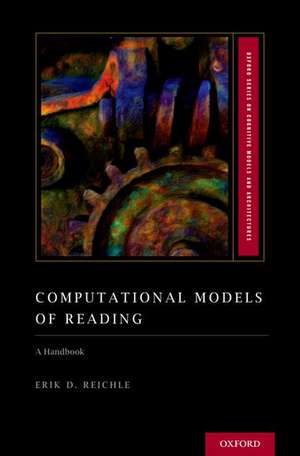Computational Models of Reading: A Handbook: Oxford Series on Cognitive Models and Architectures
Autor Erik D. Reichleen Limba Engleză Hardback – 15 apr 2021
Preț: 526.86 lei
Preț vechi: 650.44 lei
-19% Nou
Puncte Express: 790
Preț estimativ în valută:
100.81€ • 105.26$ • 83.44£
100.81€ • 105.26$ • 83.44£
Carte disponibilă
Livrare economică 15-29 martie
Preluare comenzi: 021 569.72.76
Specificații
ISBN-13: 9780195370669
ISBN-10: 019537066X
Pagini: 608
Dimensiuni: 239 x 155 x 38 mm
Greutate: 1 kg
Editura: Oxford University Press
Colecția OUP USA
Seria Oxford Series on Cognitive Models and Architectures
Locul publicării:New York, United States
ISBN-10: 019537066X
Pagini: 608
Dimensiuni: 239 x 155 x 38 mm
Greutate: 1 kg
Editura: Oxford University Press
Colecția OUP USA
Seria Oxford Series on Cognitive Models and Architectures
Locul publicării:New York, United States
Notă biografică
Erik D. Reichle is a Professor of Cognitive Psychology and the Head of the Department of Psychology at Macquarie University. His research uses computer modelling and eye-tracking experiments to understand the mental processes that are engaged during skilled reading. He has published more than 60 articles on these topics in leading peer-reviewed journals (e.g., Psychological Review, Psychological Science, Brain and Behavioral Sciences) and has received fellowships from the Hanse Institute for Advanced Study (Germany) and the Leverhulme Trust (United Kingdom).













